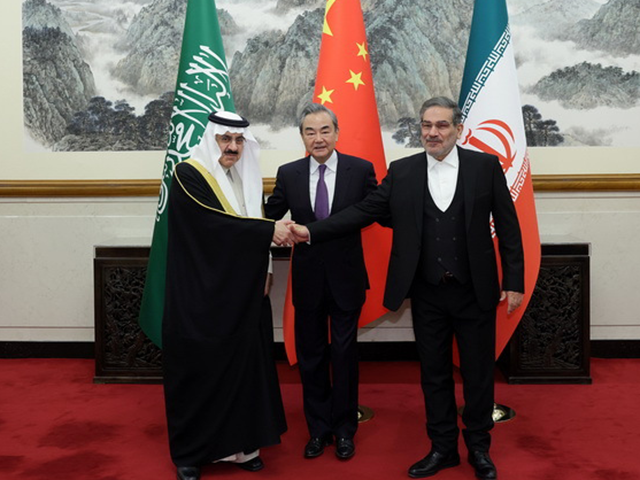The governments of Iran and Saudi Arabia — Islamist rival states that recently agreed, under the auspices of China, to restore their diplomatic relations — announced on Monday that their foreign ministers would schedule a meeting during the Muslim holy month of Ramadan.
Ramadan began on Wednesday and is expected to last until around April 20. The exact dates of the holiday depend on when religious scholars observing the night sky see the new crescent moon, signaling the beginning of a new month under the Islamic lunar calendar.
Iran, the world’s largest Shiite Muslim country, and Saudi Arabia, whose Sunni royal family is the custodian of the holiest sites in all of Islam, have maintained a bitter rivalry for years, most prominently manifesting in their ongoing support of either side of the Yemeni civil war. Saudi Arabia broke off diplomatic relations and shut down its embassy in Tehran in 2016 after Shiite rioters firebombed it and the Iranian government did little in response to the attack.
This month, Tehran and Riyadh announced that, after an extended session of talks in Beijing, the countries have agreed to restore ambassadors to their capitals and will focus on reconstructing their bilateral relationship. The Chinese Communist Party, an ally to both, touted the move as a defeat for the United States, particularly after an unpleasant visit by left-wing President Joe Biden to Saudi Arabia last summer.
The surprise Beijing announcement followed meetings between Chinese dictator Xi Jinping and the leaders of both countries, which preceded reports that both Iran and Saudi Arabia were interested in joining the BRICS coalition. Currently made up of Brazil, Russia, India, China, and South Africa — the countries that give the coalition its acronym — BRICS is a primarily commercial organization whose members have also offered each other high-profile diplomatic support on the world stage. Russia and China, in particular, have been adamant about expanding BRICS to limit the influence of the U.S. dollar.
The Saudi Press Agency (SPA), a government news outlet, announced on Monday that the Saudi government had agreed with Iran to schedule a meeting between Saudi Foreign Minister Prince Faisal bin Farhan Al Saud and Iranian Foreign Minister Hossein Amir-Abdollahian “during the ongoing month of Ramadan.”
“Saudi Arabia and Iran agree to respect state sovereignty and not interfere in internal matters,” SPA said in its report, according to the Saudi outlet Al Arabiya.
In a formal statement, the Saudi Ministry of Foreign Affairs confirmed that the meeting was agreed to in a phone call between the top diplomats that also addressed “a number of common issues in light of the tripartite agreement that was signed in the People’s Republic of China.” It did not offer any specifics regarding those issues, however.
🇸📞 🇷 | Foreign Minister HH Prince @FaisalbinFarhan receives a phone call from #Iran’s Foreign Minister @Amirabdolahian. pic.twitter.com/JzZayvV4un
— Foreign Ministry 🇸 (@KSAmofaEN) March 27, 2023
The two foreign ministers most recently spoke prior to Monday last week to mark the beginning of Ramadan and had agreed on a meeting “soon.”
Amir-Abdollahian, the Iranian foreign minister, said on Monday that the efforts to restore ties to Saudi Arabia were part of a larger move to put Iran’s international ties “on the right track,” undoing the years of diplomatic work by the United States and the greater West to ostracize the world’s largest state sponsor of terrorism. With the aid of rogue states China and Russia, Iran has endeavored to increase its regional and international influence.
“In recent days, I exchanged views with the foreign ministers of Austria, Australia, Oman, Qatar, Kuwait, Turkey, the UAE, Switzerland, Pakistan, Malaysia, Saudi Arabia, Libya and Syria,” Amir-Abdollahian confirmed on Monday. “The realization of the administration’s balanced foreign policy and dynamic diplomacy is on the right track.”
The meeting between the top diplomats may also pave the way for Iran’s president, Ebrahim Raisi, to visit Saudi Arabia. The Iranian government claimed shortly after the announcement of the success of the Beijing talks that Saudi King Salman had invited Raisi to Riyadh in the near future, though the latest statements from both sides did not indicate any imminent visit without significant planning and in-person exchanges between diplomats from both sides. Raisi visited Beijing personally in February, shortly before Riyadh and Tehran began the restoration of ties; Chinese dictator Xi Jinping visited Saudi Arabia late last year.
Iran’s restoration of ties to Saudi Arabia is occurring under the backdrop of a growing rift between Iran and Washington — and signs from the Biden administration that it may not act to ensure that Iran’s illegal nuclear weapons program does not succeed. Speaking to Congress on Thursday, the chairman of the U.S. Joint Chiefs of Staff, Gen. Mark Milley, said that America “remains committed as a matter of policy that Iran will not have a fielded nuclear weapon.” Milley’s use of the word “fielded” alarmed many national security observers who interpreted the inclusion of the adjective as suggesting that the United States would, under the current administration, be comfortable with Iran possessing an “unfielded” nuclear bomb. Neither the White House nor the Pentagon has clarified Milley’s remarks at press time.
The Biden administration welcomed China’s meddling in the Iran-Saudi Arabia conflict when first announced in mid-March.
“No sour grapes here,” White House official John Kirby said last week. “[I]f this thing has the effect that we want it to have, that’s a good thing, and the President is very comfortable with our leadership in the Middle East region, the partnerships that we have there, the relationships, and all the efforts that we are doing to hold Iran accountable.”
Follow Frances Martel on Facebook and Twitter.

COMMENTS
Please let us know if you're having issues with commenting.